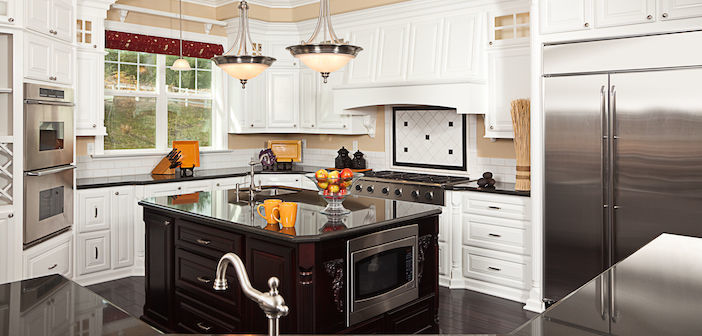DIY Home Inspection Checklist
I am NOT suggesting that you forego a professional home inspection from a licensed home inspector. Unless you ARE a professional home inspector, you should absolutely hire one after you’ve performed this checklist and your contract has been accepted.
Why?
Because a home inspection runs between $500 and $1,000. Not the end of the world — and certainly worth it on a home you really want. But it’s silly to drop that cash on a home inspection only to discover deal-breaker items you could have found on your own.
So this checklist is for you to go over once you’ve decided you like the house and want to make an offer. You don’t need special tools or training — you just need eyeballs, a notebook and pen, and a marble. If you’re feeling ambitious, take a tape measure.
General
Windows: Check that they open and close easily. Any broken panes?
Doors: Check that they open and close completely. Do they stick? Lock? Scrape the floor at any point?
Floors: Any creaking? Obvious unevenness? Place a marble on the floor and see if it rolls to check for slant. (Do the marble test in multiple locations in the house.)
Walls: Any holes?
Trim: Any damage or missing pieces? Animals can be brutal to wood trim, and matching old trim is almost impossible.
Lights: Turn on every light switch to make sure they work. (Note: If the home is unoccupied and the power is turned off, this won’t be possible.)
Stairs: Walk up and down the stairs and touch every spindle on the railing. Do they seem sturdy or wobbly? Do the stairs creak? Are any parts missing?
Outlets: Get a voltage tester at your local big box home improvement store for less than $20 and test every single outlet.
Furnace: Look at the furnace. Are there any stickers that indicate installation date?
Water Heater: Check for water around the base of the water heater. Any stickers on this to indicate installation date?
Kitchen
Cabinets/Drawers: Open every cabinet and drawer, then close again. Do they move smoothly? Does anything prevent any of the doors or drawers from easy use?
Oven: Open and inspect the oven. Does the door open slowly, indicating the springs still work? What is the condition of the oven? Turn on the oven to make sure it works.
Stove: Turn on each burner on the stove. If gas, turn on and turn off before turning the next one on to make sure they all turn on by themselves, rather than catching the flame from an adjacent burner. If they all work individually, turn them all on to make sure they all work at the same time. If electric, just turn them all on.
Fridge: Open the refrigerator/freezer doors. Do they open easily? Note: Do NOT do this if the home is vacant and appears to have been vacant for some time. Trust me on this one. Assume it must be replaced.
Dishwasher: Open and inspect the dishwasher. Do the springs work on the dishwasher door?
Faucet: Run the water in the sink. How is the pressure?
Garbage Disposal: Does the garbage disposal run? (Don’t forget to turn on the water before you test it.)
Cabinet Interiors: Take a good look at the cabinets. Is there adequate storage? Do you have enough drawers? (I once bought a condo that had one drawer in the kitchen. Sigh.)
Microwave: Open up the microwave and take a peek inside. Turn it on to see if it works — but don’t let it run for very long. That’s not good.
Hood: Turn on the range hood fan and light to make sure they work. Peek underneath to check for filth — this is a commonly overlooked area for cleaning.
Stone Countertops: Look at the stone countertop and check for chips and cracks.
Formica Countertops: Check the Formica countertop for chips.
Tile: Check the floor for cracked tiles.
Windows: Open and close all windows.

Home Inspection Electrical Guide Program
Electricity has been a permanent feature in residential occupancies for over 100 years, and it was known to be a cause of fires since the earliest days of its use. I have personally spent many hours sifting through debris after a fire, and I have witnessed homeowners who experienced an electrical fire firsthand in their homes.
This book was NOT written as a step by step guide of how to make a total electrical inspection, but rather as a guide to make certain the Home Inspector is not overlooking the critical areas that have started fires and caused accidents.
Why is fixed wiring the leading cause of a residential electrical fire? This book will not only take you to the causes, but also show the solutions of preventing an electrical fire before it starts with a proper electrical inspection of the home. It’s your moral obligation to provide the upmost in electrical safety to the homeowner.
Experienced investigators uniformly cite high-resistance connections as the most common electrical cause of fires. It has been estimated that 90% of electrical failures occur at connections. Loose wire connections at the receptacle outlets and switches are a common reason for an electrical fire in a residence.
Recent studies have shown that the frequency of fires in residential electrical systems is disproportionately higher in older homes. Three factors that could influence the likelihood of a residential electrical fire are; 1) the effects of natural aging over time on the electrical system wiring and equipment, 2) misuse or abuse of the electrical system components in the home by occupants, and 3) non-Code compliant installations, upgrades, or repairs.

Home Inspections
Home Inspections are an integral part of nearly every residential real estate transaction and knowing what to expect and how to deal with the results, from both the buying and selling side, can mean the difference between having a great experience and a frustrating (and potentially expensive) one.
there are licensing standards in many areas and even in unlicensed areas, there are several trade groups that do a great job of establishing minimum standards, but these standards fall short of truly protecting buyers from the unknown – these standards are really meant to reduce an inspector’s liability and that is not what you want as a home buyer
With that being said, there’s only one certification in the industry that requires inspectors to provide a 100% satisfaction guarantee, an inspection that goes beyond minimum standards providing true protection for buyers and sellers alike, and quality service that is continuously monitored by a third party; that would be the Certified Inspection Expert.
For example, if you move in and discover that a pipe is leaking under a sink, what do you do? This guide will show you how to get that repair done for free – just by choosing the right home inspector.
In fact, this website will explain how to be covered against literally hundreds of potential failures at no cost to you – giving buyers true peace of mind while in many regards reducing liability for a seller as well – and it is something that is offered by the leading home inspection companies
Home Inspection
Home Inspection provides you with the ‘information’ you need to make an informed decision about the property being inspected in a clear, concise, and professional manner. We deliver an oral report on site and a detailed, electronic report to all customers following the inspection.
Now that you’ve found a home that you love and want to buy, here’s a thought: Let your head take over for your heart. Make certain this is really the wonderful place it appears to be. The last thing you want is to move into a home unaware of existing or potential problems. Problems that could be costly to repair or, worse, beyond repair.
are impartial and work exclusively for you. Our sole job is to provide you with a comprehensive, fair, independent, objective evaluation so that you know as much as possible about your valuable new investment. You don’t want any surprises when you move in.
take our time poking through a home’s structure and systems… an exploration that’s an invaluable learning and discovery experience for you as well. That’s why we wholeheartedly encourage you to accompany us during the 2-3 hour inspection. This will allow your inspector to answer questions and explain the significance of his observations
We want you to go through the house with us so that we may inform you of any deficiencies or concerns, discuss “how things work”, and also share with you what needs to be maintained and why. This is why we say “Not just a Home Inspection… A Home Instruction!” Don’t worry, we are a ‘jargon-free’ company and we will explain everything in terms you can understand.
HOME INSPECTIONS
Home Inspections provide a wide range of home inspection services. Home Inspections believe it’s essential to fully understand all parts of a property before purchasing. Because of this, Home Inspections provide in-depth presentations contains both our findings from the inspection and helpful maintenance tips going forward.
has specific requirements for home inspections and we take pride in adhereing to every recommendaiton they make to provide the best home inspeciton possible.
owned and operated by firefighters and have a deep commitment to helping our communities. Our inspectors are highly trained and held to the highest standards
Home Inspections exceed the continuing education requirements so we can stay up to date on changing building standards. Home Inspections provide inspections for older homes and new builds.
Home Inspections can help ensure structural integrity. Home Inspections know that the the home buying process is stressful, so we’re here to help guide you through the pre-purchase inspection. We’ll make it easy and give you peace of mind